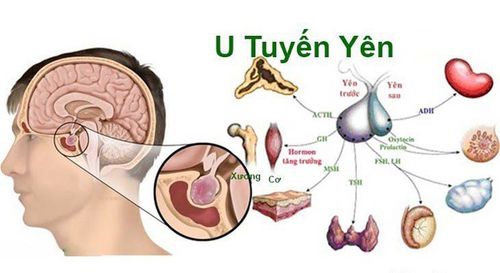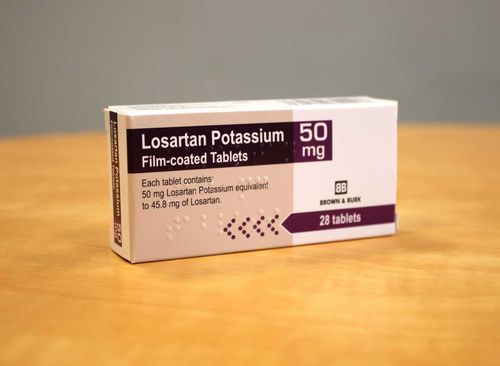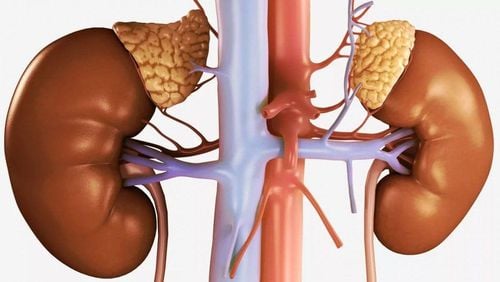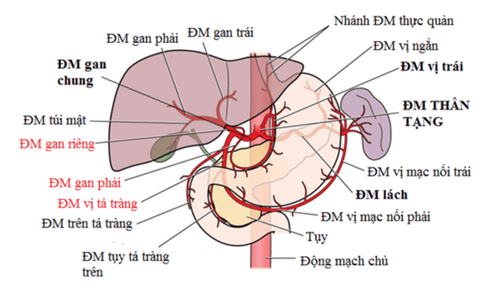This is an automatically translated article.
Adrenal tumors are tumors that develop in the adrenal glands. This is a rare disease that can cause complications that seriously affect the patient's health.1. What is adrenal gland tumor?
The adrenal gland is an important endocrine gland located deep in the peritoneum. There are two adrenal glands, each located on one side of the kidney. The adrenal gland produces hormones, participates in the metabolism of sugar and electrolytes, especially catecholamines have an important role in regulating arterial blood pressure.Adrenal adenoma can occur on either side of the adrenal gland or on both sides. Adrenal tumors cause different pathologies depending on the nature of the medullary or cortical tumor.
The majority of adrenal gland tumors are benign, however, a small number of cases can be malignant (cancerous) tumors. The disease can occur at any age, but most sufferers are between the ages of 20 and 50.
2. Adrenal tumor complications
Because the tumor releases hormones that raise blood pressure, the typical symptom of an adrenal tumor is episodes of paroxysmal hypertension.During a hypertensive crisis, the patient's blood pressure is very high, tachycardia, severe headache, pale skin, nausea, feeling chills, pupils dilated, the patient urinates a lot, and pain is reduced. chest, panic, shortness of breath.
Paroxysmal hypertensive crisis is often triggered by physical exertion, stress, anxiety, surgery, anesthesia, eating foods rich in tyramine such as: Cheese, smoked meat,...

U tuyến thượng thận gây ra những bệnh lý khác nhau, làm ảnh hưởng đến cuộc sống của người bệnh
A hypertensive crisis may last a few minutes or a few hours, then subside on its own without any treatment. Long-term untreated high blood pressure will lead to many dangerous complications such as papilledema, retinal hemorrhage, cerebrovascular accident, kidney failure, heart failure.
If the adrenal tumor is malignant, the cancer cells will metastasize to other parts of the body such as the lymphatic system, bones, liver, lungs, etc., which is life-threatening.
3. Should adrenal tumors be operated on?
If the tumor is discovered incidentally, the size is small and the patient has no signs of hormone excess and no hypertension, then treatment can be delayed, the tumor will be monitored periodically. to ensure it remains dimensionally stable and remains inactive. If the tumor grows rapidly, reaching a size of about 5cm, surgery is needed to remove it.
Adrenal tumors cause increased hormone secretion and increased blood pressure, no matter how large or small, need surgery to remove. Adrenal tumor surgery is a difficult surgery, because the adrenal gland is located deep in the peritoneum, above the kidney and close to the diaphragm, so it is difficult to access.
3.1. Before surgery, the doctor will prescribe certain blood pressure medications to reduce the risk of high blood pressure during surgery, these drugs can supplement or replace the blood pressure medications the patient is taking. use.

Phẫu thuật nội soi u tuyến thượng thận có nhiều ưu điểm và ít biến chứng
3.2. During surgery If the tumor is small (<5cm) and benign (not cancerous), laparoscopic surgery can be used. If the tumor is large (>5cm) or cancerous, the patient will be indicated for open surgery. Laparoscopic surgery has many advantages such as: less invasive, less bleeding, reduced complications, reduced hospital stay, quick patient recovery. After surgery, the patient will be closely monitored arterial blood pressure, temperature, breathing rate and drainage every 15 - 30 minutes.
If laparoscopic surgery is performed, the patient can be discharged from the hospital in 1 to 3 days and can resume daily activities after a week. If open surgery is performed, the patient must stay in the hospital for 5-7 days and do not lift heavy objects for 6 weeks after surgery. In some cases, the entire adrenal gland must be removed, leaving the remaining healthy adrenal gland to perform its endocrine function.
3.3. After surgery, the patient's condition is usually stable, endocrine function returns to normal, and hypertension is eliminated. If the adrenal tumor is malignant (cancerous), depending on the case, the patient may be prescribed methods such as radiation therapy, chemotherapy, targeted therapy.
Currently, high-tech imaging techniques such as CT scan, MRI, PET, targeted therapy at Vinmec International General Hospital help detect and screen tumors with high accuracy.
Please dial HOTLINE for more information or register for an appointment HERE. Download MyVinmec app to make appointments faster and to manage your bookings easily.













